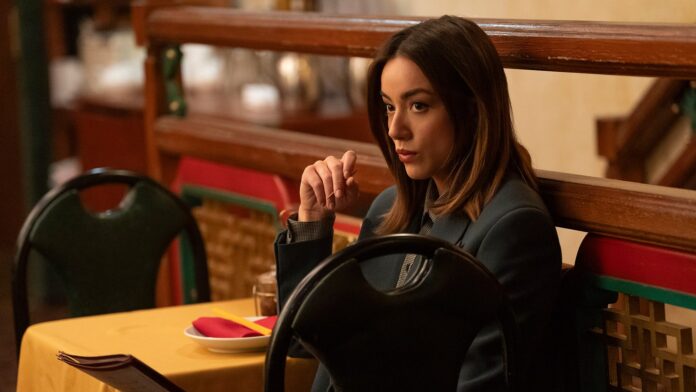In the world of Interior Chinatown, Willis Wu is trapped as a background character in the show-within-a-show police procedural, Black and White. Adapted from Charles Yu’s National Book Award-winning novel of the same name, Interior satirizes the stifling limitations that Asian representation offers. The Hulu original series follows Willis—played by Jimmy O. Yang—as he embarks on a journey to break out of the roles he’d been destined to, in hopes of being something special; something like “Kung Fu Guy.” Leading up to its premiere I spoke with Chloe Bennet, who plays Detective Lana Lee, to discuss how the show clarified her thoughts on Asian American representation, and how it helped her work through her identity as a mixed Asian actress.
This interview has been edited for clarity and length.
Jalen Jones: Interior Chinatown is such a rich story, with so much to say about Asian American representation in the media. How did the series change how you personally think about representation?
Chloe Bennet: I think it further highlighted the way I already felt. Through the show, [Charles Yu] was able to articulate in such a cerebral and satirical and funny way things that I have thought about my whole life. You know that feeling when you’re reading something and you go, “These are my thoughts?” [Interior Chinatown] captured my thoughts and regurgitated them in an eloquent way that I would never be able to do myself.
JJ: This feels like a role that’s been most in touch with your Chinese American roots. Did you find yourself approaching this role differently compared to other roles you’ve done?
CB: I think the fun part of that question is, no, I don’t think I did. Because being mixed, and my dad being Chinese and being raised very culturally Chinese, and having lived over there, it’s always a part of every role that I’ve done. But this was really exciting because it is an unbelievably special experience.
Chloe Bennet plays Detective Lana Lee in “Interior Chinatown.”
Courtesy of Tremendous PR
I would get chills and this weird feeling all the time on this set. Because for me, I always identified work with being this “white” thing. There’s this internalized part of you that’s always telling you to kind of assimilate in a certain way, with a certain world, and that that world won’t understand this really big part of you. On Interior, nothing about [those identities] had to be separated. And to look around and hear Mandarin on set, to look around and look at the crew, which was incredibly diverse. And it wasn’t because we were casting and hiring people because they’re Asian, but because they’re really good, and because they’re the best in their field, and just happen to be Asian. And that makes them able to tell the story with even more confidence and more detail. That part of it is so special.
I am a big advocate for [our work] being really, really f*cking good. To be surrounded by such a diverse crew, who also are so wildly talented at what they do—that’s really special. This is ultimately the type of work that moves the needle, that shifts the culture and creates change. Because it can’t just be surface level.
JJ: I bet that must have been such a liberating experience.
CB: Yeah, it’s really cool. And like, obviously in Asian culture, the way we interact with elders is different than how white people interact with their elders, so it was fun to have my grandma, my 奶奶 [nǎinai], come to our set, especially when knowing that the whole crew and everyone will interact with our grandparents, with our parents—everyone had family come to the set, and it was just a really big family experience. That was something that I didn’t realize I had never had before on set, so that was very special.
JJ: You got to bring your grandma on set?!
CB: Oh my god, yeah. She came and was like, talking to Jimmy in Shanghainese. It was very, very fun. And I got to bring my dad. We shot on these massive sets built out to look like Chinatown, which is such a backdrop for any Chinese American.
JJ: I feel like your character Lana Lee’s ethnically ambiguous appearance played a part in her allure for Willis and others, especially when she was first introduced. I’m wondering how you interpreted this moment in the show, and whether it made you think about mixed identity differently.
CB: Oh my gosh, yeah, I don’t think I’m ever not thinking about mixed identity. I think that will always be this thing that I have this very weird, malleable relationship with. And I don’t think I’ve ever felt entirely settled on what my opinion exactly is, or how I feel about it, because I think it’s always changing.
I was utilized as this thing in media where I was “ethnic enough,” where I wouldn’t put off white viewers, but would be relatable enough for, you know, “insert race” viewers.
But definitely I think for Lana, a big theme for her kind of was the identity crisis that she has throughout the show. For me, being a mixed-race actress on TV and having spent most of my life as this kind of corporate pawn, I was utilized as this thing in media where I was “ethnic enough,” where I wouldn’t put off white viewers, but would be relatable enough for, you know, “insert race” viewers.
Being in corporate TV for a long time, a lot of that gave me an identity crisis. Growing up in the industry for over 15 years, you attach your self-worth based on how valuable you are to people in that way. That’s really damaging, and that’s kind of what I’ve had to navigate and work through. It’s very different from being immediately visually identifiable as something, and it comes with its own experiences. And that was what I was really interested in exploring. I think for a lot of mixed-race people, or even people who just feel like they have one foot in one world and one foot in another, it’s a relatable experience. So that was very exciting to get to work through.

Promotional poster for “Interior Chinatown.”
Courtesy of Tremendous PR
JJ: You know what you said earlier about hearing somebody and going, “These are my thoughts, but in a more eloquent way?” That’s literally what you just did. Those are my thoughts exactly, and I’ve been experiencing similar things my whole life.
CB: It’s hard to capture, because it’s the absence of something, somehow. And I think this is what people don’t necessarily want to talk about—it doesn’t come just from the white side. It very much also comes from my Chinese side, and not being validated in that way too. At the same time, my experience doesn’t take away from anyone else’s experience. All you can do is think through it, navigate through it, talk about it, and be honest about your own feelings with the positions you’ve been put in. Does that make sense?
JJ: Yeah. I mean, I lived it! Lastly, what would you tell fellow mixed-Asian actresses and artists who hope to follow in your footsteps?
CB: I would say you are whole. And take time to reflect on you. I think I found myself diminishing myself, or making myself small to fit in “one side.” But you are allowed to take up space entirely as you are. Being “half” of something doesn’t mean you are half of a person, or that you don’t get to have your own experiences. For me, the most helpful thing was constantly being reflective with myself, not from an ego way, but in that I think we have the power of perspective, and that that’s a real gift in many ways. That should be what we focus on, because it can be easy to feel like, “I don’t feel like I fit in here, so where do I belong?” Instead, I think this journey is about finding the source within yourself, and building your own confidence in the fact that you actually have multiple things to be a part of.

